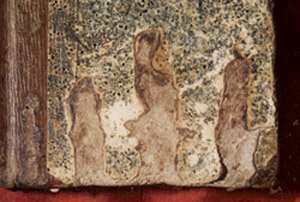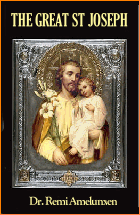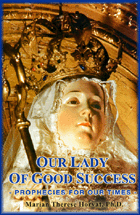Faith under Attack
 |
 |
 |
 |
 |
 |
 |
On Purgatory - Part I
Purgatory Is a Dogma of the Faith
The themes of the Sabbatine Privilege, the 30 Gregorian Masses and indulgences were addressed to show their advantage for releasing souls from Purgatory. What follows is a more detailed presentation of that much forgotten – if not denied – dogma of Purgatory, the place where the souls of the members of the Church Suffering make expiation for their sins.
In his day, St. Francis de Sales (1567-1622) deplored how our departed ones were forgotten, stating: “Their memory seems to perish with the sound of the funeral bells.” (1) As the Jesuit Fr. François Xavier Schouppe states in his brilliant book Purgatory Explained, “the principal causes of this forgetfulness are ignorance and lack of faith; our notions about Purgatory are too vague and our faith too feeble.”
To correct these deficiencies, he sets forth three sources of light to elucidate the faithful on the great importance of this topic: Church doctrine, the teachings of Church Doctors and theologians, and the revelations of the Saints.
Dogmatic teaching on Purgatory
The Church sets forth two truths clearly defined as dogmas of faith: first, there is a Purgatory; second, the souls that are in Purgatory may be assisted by the suffrage of the faithful, especially by the Holy Sacrifice of the Mass.
In response to the Protestant Revolution, the Council of Trent reaffirmed the existence of Purgatory as already taught by the First Council of Lyon. It also instructed Bishops to have the sound Church doctrine on Purgatory taught and preached everywhere so it might be held and believed by Catholics. Here cited are three important Canons of Trent:
• Session 255 (1563) - Decree on Purgatory – Since the Church, instructed by the Holy Ghost, has taught in Sacred Councils and very recently in this Ecumenical Council, following the Sacred Writings and the ancient tradition of the Fathers, that there is a Purgatory, and that the souls there detained are aided by the suffrages of the faithful and chiefly by the acceptable Sacrifice of the Altar, the Holy Council commands the Bishops that they strive diligently so that the sound doctrine of Purgatory, transmitted by the Fathers and Sacred Councils, be believed and maintained by the faithful of Christ, and be everywhere taught and preached.
• Session 6 (1547) - Canon 30 – If anyone says that after receiving the grace of justification [Sacrament of Penance], the guilt is fully remitted and the debt of eternal punishment is so blotted out to every repentant sinner that no debt of temporal punishment remains to be discharged, either in this world or in Purgatory, before the gates of Heaven can be opened, let him be anathema.
• Session 14 (1551) - Canon 12 – If anyone says that God always pardons the whole penalty together with the guilt and that the satisfaction [for sin] made by penitents is nothing but the faith by which they perceive that Christ has satisfied for them, let him be anathema.
• Canon 13 – If anyone says that satisfaction for sins, as to their temporal punishment, is in no way made to God through the merits of Christ by the punishments inflicted by Him and patiently borne, or by those [penances] imposed by the priest, or even those voluntarily undertaken such as fasts, prayers, almsgiving or other works of piety, and that, therefore, the best penance is merely a new life, let him be anathema.
• Canon 14 – If anyone says that the satisfactions by which penitents atone for their sins through Christ are not a worship of God but traditions of men, which obscure the doctrine of grace and the true worship of God and the benefit itself of the death of Christ, let him be anathema.
From this doctrine it is clear that the existence of Purgatory is a dogma of the Catholic Church and they who deny it cannot call themselves Catholics.
The value of private revelations
The revelations given to the Saints, called private revelations, do not belong to the Deposit of Faith confided by Our Lord Jesus Christ to His Church. They are historical facts, based on human testimony that we may not believe without sinning against faith. But as they are authenticated, we cannot reject them without offense against reason, which demands assent to truth when adequately demonstrated.
Private revelations are of two kinds, visions and apparitions. Visions are subjective lights infused by God into the understanding of chosen persons to reveal His mysteries. Such are the visions of many Prophets and Saints to supernaturally convey spiritual truth to man.
Apparitions are objective phenomena that can be proved by material evidence exterior to the persons who received them. Apparitions of the souls in Purgatory are frequent and can be proved by the objects they touched that were imprinted with fiery marks. Such apparitions are found in great number in the lives of the Saints.
Concrete evidence left behind by these souls were collected by a priest in the 19th century, Fr. Victor Jouet, and deposited in a special Museum of the Poor Souls in Rome. You can read about those Church-approved artifacts here and here.
God permits apparitions of this kind for the relief of souls as well as to inspire our compassion and prayers for them. They also serve to emphasize how terrible are the rigors of His Justice against those faults that we unfortunately consider only trivial.
Our Lady consoles the Poor Souls
The souls of the Church Suffering have always implored the suffrages of the members of the Church Militant. Our prayers and offerings on their behalf are a source of tremendous relief to them. For the living, it is a means to greater sanctity.
One great consolation to the souls in Purgatory is the visits from the Blessed Virgin Mary. In the Revelations of St. Bridget, the Queen of Heaven calls herself the beautiful name of “Mother of the Souls in Purgatory, the Mother of all those who are in the place of expiation.” She continues, “My prayers mitigate the chastisements inflicted on sinners for their faults.” (2)
Our Lady exercises her mercy in Purgatory especially on Saturdays and on her different feasts, which become festival days in Purgatory. As seen in the revelations of many Saints, on Saturday – the day specially consecrated to her, Our Lady descends into the dungeons of Purgatory to visit and console those devoted to her. According to pious belief, she delivers souls who have worn her scapular and deserve the Sabbatine Privilege, and then gives relief and consolation to other souls who practiced true devotion to her.
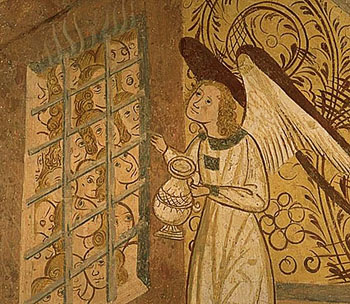 One witness of this was the Ven. Sister Paula of St. Teresa, a Dominican religious of the Convent of St. Catherine in Naples. One Saturday she fell into ecstasy and was transported in spirit to Purgatory, where she found it transformed into a paradise of delights, illuminated by bright light instead of darkness. She then saw the Queen of Heaven surrounded by Angels, to whom she gave orders to liberate those special souls and conduct them into Heaven. (3)
One witness of this was the Ven. Sister Paula of St. Teresa, a Dominican religious of the Convent of St. Catherine in Naples. One Saturday she fell into ecstasy and was transported in spirit to Purgatory, where she found it transformed into a paradise of delights, illuminated by bright light instead of darkness. She then saw the Queen of Heaven surrounded by Angels, to whom she gave orders to liberate those special souls and conduct them into Heaven. (3)
The feast day of her glorious Assumption seems to be one of special deliverance. St. Peter Damian states that on this day, the Blessed Mother delivers several thousands of souls. (4) This is because Our Lady delights to introduce her children into the glory of Heaven on the day that she herself beheld the beatific vision.
Besides the consolations received from the Blessed Mother, the Poor Souls are also consoled by the holy Angels, especially by their Guardian Angels. The Doctors of the Church teach that the protective mission of the Guardian Angels terminates only on the entrance of their protégées into Paradise.
If, at the moment of death, a soul in the state of grace is not yet worthy to see the face of God, the Guardian Angel conducts the soul to the place of expiation and remains there to procure for that soul all the assistance and consolations in his power. (5) The goal of the devoted Guardian is to help that soul to enter its home in Heaven.
In an apparition to St. Margaret of Cortona who was praying for the Poor Souls in Purgatory, Our Divine Redeemer told her: "The pains they endure are very great, but would be incomparably greater if they were not visited and consoled by My Angels, the sight of whom comforts them in their sufferings and refreshes them in their purification." (6)
These revelations are perfectly consistent with Church teaching. According to many Church Doctors, the Guardian Angels inform the souls in Purgatory who their benefactors are and exhort them to pray for them.
Ven. Agnes of Jesus, who lived in constant familiar intercourse with the holy Angels, relates many apparitions in which she saw the Guardian Angels making intercession for their protégées, bringing to them consolations in the midst of the flames where they suffered, and leading them to Heaven when the time of their expiation is finished. (7)
Our Lady and the Holy Angels are the natural intermediaries between Purgatory and earth, as they are between Heaven and Purgatory. What a consolation this is to those who during their lives have shown devotion to the Blessed Virgin and to their Guardian Angels!
Continued

In his day, St. Francis de Sales (1567-1622) deplored how our departed ones were forgotten, stating: “Their memory seems to perish with the sound of the funeral bells.” (1) As the Jesuit Fr. François Xavier Schouppe states in his brilliant book Purgatory Explained, “the principal causes of this forgetfulness are ignorance and lack of faith; our notions about Purgatory are too vague and our faith too feeble.”
To correct these deficiencies, he sets forth three sources of light to elucidate the faithful on the great importance of this topic: Church doctrine, the teachings of Church Doctors and theologians, and the revelations of the Saints.
Dogmatic teaching on Purgatory
The Church sets forth two truths clearly defined as dogmas of faith: first, there is a Purgatory; second, the souls that are in Purgatory may be assisted by the suffrage of the faithful, especially by the Holy Sacrifice of the Mass.
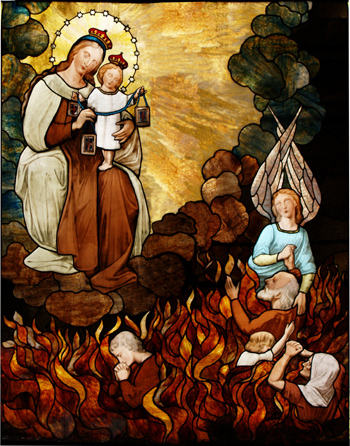
Our Lady provides solace to the Poor Souls in Pugatory
• Session 255 (1563) - Decree on Purgatory – Since the Church, instructed by the Holy Ghost, has taught in Sacred Councils and very recently in this Ecumenical Council, following the Sacred Writings and the ancient tradition of the Fathers, that there is a Purgatory, and that the souls there detained are aided by the suffrages of the faithful and chiefly by the acceptable Sacrifice of the Altar, the Holy Council commands the Bishops that they strive diligently so that the sound doctrine of Purgatory, transmitted by the Fathers and Sacred Councils, be believed and maintained by the faithful of Christ, and be everywhere taught and preached.
• Session 6 (1547) - Canon 30 – If anyone says that after receiving the grace of justification [Sacrament of Penance], the guilt is fully remitted and the debt of eternal punishment is so blotted out to every repentant sinner that no debt of temporal punishment remains to be discharged, either in this world or in Purgatory, before the gates of Heaven can be opened, let him be anathema.
• Session 14 (1551) - Canon 12 – If anyone says that God always pardons the whole penalty together with the guilt and that the satisfaction [for sin] made by penitents is nothing but the faith by which they perceive that Christ has satisfied for them, let him be anathema.
• Canon 13 – If anyone says that satisfaction for sins, as to their temporal punishment, is in no way made to God through the merits of Christ by the punishments inflicted by Him and patiently borne, or by those [penances] imposed by the priest, or even those voluntarily undertaken such as fasts, prayers, almsgiving or other works of piety, and that, therefore, the best penance is merely a new life, let him be anathema.
• Canon 14 – If anyone says that the satisfactions by which penitents atone for their sins through Christ are not a worship of God but traditions of men, which obscure the doctrine of grace and the true worship of God and the benefit itself of the death of Christ, let him be anathema.
From this doctrine it is clear that the existence of Purgatory is a dogma of the Catholic Church and they who deny it cannot call themselves Catholics.
The value of private revelations
The revelations given to the Saints, called private revelations, do not belong to the Deposit of Faith confided by Our Lord Jesus Christ to His Church. They are historical facts, based on human testimony that we may not believe without sinning against faith. But as they are authenticated, we cannot reject them without offense against reason, which demands assent to truth when adequately demonstrated.
Private revelations are of two kinds, visions and apparitions. Visions are subjective lights infused by God into the understanding of chosen persons to reveal His mysteries. Such are the visions of many Prophets and Saints to supernaturally convey spiritual truth to man.
Apparitions are objective phenomena that can be proved by material evidence exterior to the persons who received them. Apparitions of the souls in Purgatory are frequent and can be proved by the objects they touched that were imprinted with fiery marks. Such apparitions are found in great number in the lives of the Saints.
Concrete evidence left behind by these souls were collected by a priest in the 19th century, Fr. Victor Jouet, and deposited in a special Museum of the Poor Souls in Rome. You can read about those Church-approved artifacts here and here.
God permits apparitions of this kind for the relief of souls as well as to inspire our compassion and prayers for them. They also serve to emphasize how terrible are the rigors of His Justice against those faults that we unfortunately consider only trivial.
Our Lady consoles the Poor Souls
The souls of the Church Suffering have always implored the suffrages of the members of the Church Militant. Our prayers and offerings on their behalf are a source of tremendous relief to them. For the living, it is a means to greater sanctity.
One great consolation to the souls in Purgatory is the visits from the Blessed Virgin Mary. In the Revelations of St. Bridget, the Queen of Heaven calls herself the beautiful name of “Mother of the Souls in Purgatory, the Mother of all those who are in the place of expiation.” She continues, “My prayers mitigate the chastisements inflicted on sinners for their faults.” (2)
Our Lady exercises her mercy in Purgatory especially on Saturdays and on her different feasts, which become festival days in Purgatory. As seen in the revelations of many Saints, on Saturday – the day specially consecrated to her, Our Lady descends into the dungeons of Purgatory to visit and console those devoted to her. According to pious belief, she delivers souls who have worn her scapular and deserve the Sabbatine Privilege, and then gives relief and consolation to other souls who practiced true devotion to her.

An angel provides relief to a soul in Purgatory
The feast day of her glorious Assumption seems to be one of special deliverance. St. Peter Damian states that on this day, the Blessed Mother delivers several thousands of souls. (4) This is because Our Lady delights to introduce her children into the glory of Heaven on the day that she herself beheld the beatific vision.
Besides the consolations received from the Blessed Mother, the Poor Souls are also consoled by the holy Angels, especially by their Guardian Angels. The Doctors of the Church teach that the protective mission of the Guardian Angels terminates only on the entrance of their protégées into Paradise.
If, at the moment of death, a soul in the state of grace is not yet worthy to see the face of God, the Guardian Angel conducts the soul to the place of expiation and remains there to procure for that soul all the assistance and consolations in his power. (5) The goal of the devoted Guardian is to help that soul to enter its home in Heaven.
In an apparition to St. Margaret of Cortona who was praying for the Poor Souls in Purgatory, Our Divine Redeemer told her: "The pains they endure are very great, but would be incomparably greater if they were not visited and consoled by My Angels, the sight of whom comforts them in their sufferings and refreshes them in their purification." (6)
These revelations are perfectly consistent with Church teaching. According to many Church Doctors, the Guardian Angels inform the souls in Purgatory who their benefactors are and exhort them to pray for them.
Ven. Agnes of Jesus, who lived in constant familiar intercourse with the holy Angels, relates many apparitions in which she saw the Guardian Angels making intercession for their protégées, bringing to them consolations in the midst of the flames where they suffered, and leading them to Heaven when the time of their expiation is finished. (7)
Our Lady and the Holy Angels are the natural intermediaries between Purgatory and earth, as they are between Heaven and Purgatory. What a consolation this is to those who during their lives have shown devotion to the Blessed Virgin and to their Guardian Angels!
Continued
- F. X. Schouppe, Purgatory Explained by The Lives and Legends of the Saints, Rockford: TAN, 2006, p. xxxiii
- Revel: 8, Brig., lib. 4, c 50, in ibid., p. 178
- Rossign., Merc., 50; Marchese, tom. i., p. 56, in ibid., p. 180
- Opusc. 34, c.3,f.2, in ibid., p. 180
- Rev. H. Faure, S.M., The Consolations of Purgatory, Benzinger Bros, 1912, p. 65
- Ibid.
- Ibid, p. 66

Posted December 4, 2013
______________________
______________________
